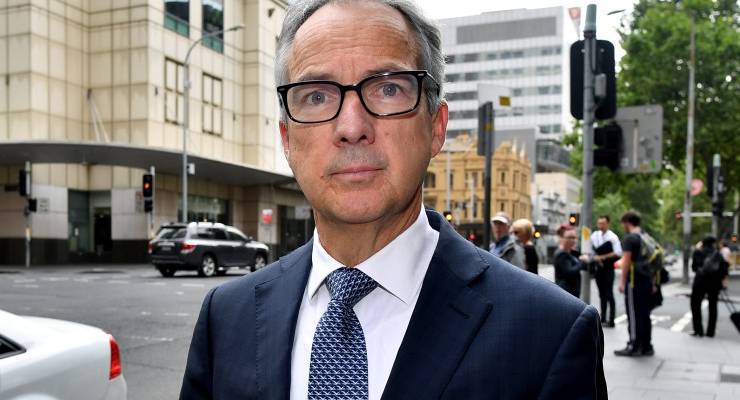
Who’s the best person to keep an eye on the financial regulators charged with monitoring the biggest and most powerful companies in Australia?
The obvious answer would be a fiercely independent person with no history of being paid millions by the very companies the regulators are supposed to scrutinise.
But Treasurer Josh Frydenberg thinks otherwise. He has appointed a man synonymous with the excesses of the financial sector, former Macquarie Group CEO Nicholas Moore, who helped turn Macquarie Bank into the millionaire’s factory it’s known as today.
Moore will chair the government’s inaugural Financial Regulator Assessment Authority (FRAA), a body that will “review and report on the effectiveness of the country’s two financial regulators”: the Australian Securities and Investments Commission (ASIC) and the Australian Prudential Regulation Authority (APRA).
In doing so, the regulators will be held to account by someone whose own bank was previously found to have breached the very rules the regulators are in charge of policing.
From witness to watchdog
Moore stepped down from Macquarie Group in 2018 with $27.9 million. The investment banking titan had served the bank for 33 years, 10 years as CEO.
Unlike most bankers who were hung out to dry by the royal commission, Moore endured a much softer grilling — even earning praise for his performance. This despite Macquarie being slapped with an enforceable undertaking in 2013 after ASIC uncovered eight potential breaches of the Corporations Act and a potential breach of its financial services licence.
A 2013 report into the bank found the advisers in the business “do not provide financial advice in a compliant manner; that advisers provided advice which is inappropriate; advisers provide financial services to clients without the express instruction of the client”.
Moore has since chaired a number of public and private boards including software start-up Willow and The Smith Family. He is also chair of libertarian think tank Centre for Independent Studies which calls for, among other things, less government regulation of the private sector — the very thing he now must do.
With this latest appointment, Moore is chairing a body that was established in response to recommendations by the banking royal commission — despite being called as a witness at the same royal commission over misconduct inside Macquarie.
A friendly appointment
Moore and Frydenberg know each other well. As the AFR’s Pamela Williams reported last year, Moore was the government’s hand-picked “eyes and ears” inside the commercially sensitive sale of Virgin, which had huge national economic ramifications.
Frydenberg was at first secretive about what role Moore was playing in the sale, later admitting he was “engaging with the administrator on behalf of the government”.
Macquarie Group is also one of the country’s biggest political donors, funnelling $251,320 into Liberal and Labor coffers in the 2019-20 financial year.
Gutted and hamstrung ASIC
Frydenberg has used the pandemic as cover to return to the government’s old strategy of gutting and hamstringing ASIC, which was a key reason it ended up being forced into calling the banking royal commission.
He used the departure of James Shipton and Daniel Crennan QC to impose a mandate on ASIC that demanded it “contribute to the government’s economic goals, including supporting Australia’s economic recovery from the COVID-19 pandemic”, following concerns from Liberals that the regulator was doing too much regulating.
ASIC promptly dropped its “why not litigate” approach adopted after the royal commission.
Just to make sure ASIC got the message, Frydenberg — after increasing ASIC’s funding after the royal commission — returned to the Abbott-era tactic of slashing its resourcing. In the 2021 budget, he cut more than $18 million from its appropriation. Combined with cuts to its external revenue and other reductions, ASIC’s total funding fell by $56 million, which will cost more than 200 staff — though part of that reflects a shift of business registry functions to the ATO.
Which 2028 royal commission will be the result of the latest curbing of ASIC? Well that’s a problem for another government several elections away.









Watch dog or lap dog? Another white man in a suit being paid to watch over other (mostly) white men in suits. What could possibly go wrong?
What can we say…(questionable) business as usual!!
Josh Fraudberg : “I’m a fixer too. I fix things to work out the way I, on behalf of my donor patrons, want them too.”?
As a constituent of the Kooyong electorate,I am looking forward to the coming Federal election. A lot of stuff is buzzing in the ether around the electorate.
So Fraudberg might end up in the senate some time soon after the election, and after a “casual vacancy”/”offer they couldn’t refuse” was offered to a lesser Coalition brown-out light in the senate? To keep Josh simmering, until a later “bus-accident”/”by-election” can be arranged to slide him back into the unrepresentative “Reps” – as easily as sliding the “vacancy” under that bus?
FFS it just keeps getting worse every day under any Coalition government.
Frydenberg has appointed a man synonymous with the excesses of the financial sector, former Macquarie Group CEO Nicholas Moore. [Jane Hume ex Macquarie too]
Understandable when you realize that Frydenberg Dual don’t mention the war was the Director of Global Banking with Deutsche Bank in the company’s Melbourne office, the two years before that were spent as a policy adviser to Lying Rodent John Howard, Frydenberg specialising in domestic security issues, border protection, justice and industrial relations. In 1999, Frydenberg worked as an assistant adviser to Attorney-General Daryl Williams before becoming an adviser to Foreign Affairs Minister Alexander Downer, a post he held until 2003.
So as you can see, he’s the perfect fit for the mobsters.
Frydenberg and Deutsche Bank? Hockey? His wife – Melissa Babbage, was at the merchant bank UBS before she rose to become a managing director at Deutsche Bank Australia.
Now there’s a bank full of scandal, sleaze and corruption; excellent position for someone like Frydenberg.